选修六第二单元 语法
选修6unit2知识点
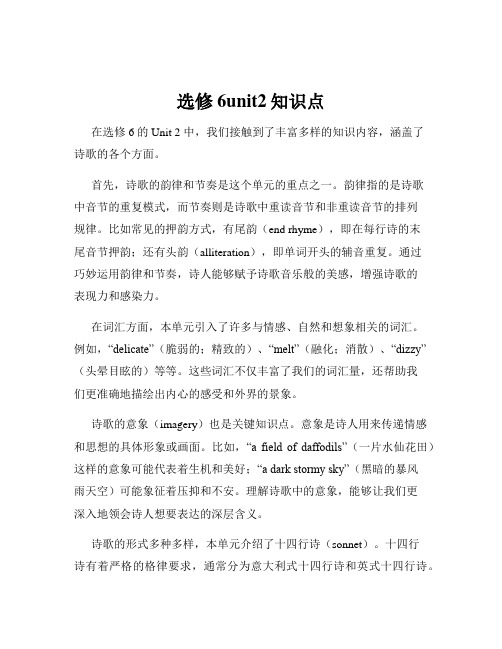
选修6unit2知识点在选修 6 的 Unit 2 中,我们接触到了丰富多样的知识内容,涵盖了诗歌的各个方面。
首先,诗歌的韵律和节奏是这个单元的重点之一。
韵律指的是诗歌中音节的重复模式,而节奏则是诗歌中重读音节和非重读音节的排列规律。
比如常见的押韵方式,有尾韵(end rhyme),即在每行诗的末尾音节押韵;还有头韵(alliteration),即单词开头的辅音重复。
通过巧妙运用韵律和节奏,诗人能够赋予诗歌音乐般的美感,增强诗歌的表现力和感染力。
在词汇方面,本单元引入了许多与情感、自然和想象相关的词汇。
例如,“delicate”(脆弱的;精致的)、“melt”(融化;消散)、“dizzy”(头晕目眩的)等等。
这些词汇不仅丰富了我们的词汇量,还帮助我们更准确地描绘出内心的感受和外界的景象。
诗歌的意象(imagery)也是关键知识点。
意象是诗人用来传递情感和思想的具体形象或画面。
比如,“a field of daffodils”(一片水仙花田)这样的意象可能代表着生机和美好;“a dark stormy sky”(黑暗的暴风雨天空)可能象征着压抑和不安。
理解诗歌中的意象,能够让我们更深入地领会诗人想要表达的深层含义。
诗歌的形式多种多样,本单元介绍了十四行诗(sonnet)。
十四行诗有着严格的格律要求,通常分为意大利式十四行诗和英式十四行诗。
意大利式十四行诗分为前八行(octave)和后六行(sestet),而英式十四行诗则包括三个四行组(quatrain)和一个对句(couplet)。
诗歌的主题也是值得我们深入探讨的部分。
在 Unit 2 中,我们接触到了关于爱情、自然、人生哲理等主题的诗歌。
通过对这些主题的研读,我们能够感受到诗人对生活的独特见解和深刻思考。
此外,诗歌的修辞手法也不容忽视。
比喻(metaphor),将一个事物比作另一个事物,使描述更加生动形象;拟人(personification),赋予非人类的事物以人类的特征和行为,让诗歌充满活力;夸张(hyperbole),通过极度夸大或缩小来强调情感和感受。
选修6unit2知识点

选修6unit2知识点在英语学习的征程中,选修 6unit2 蕴含着丰富而重要的知识点,让我们一同来深入探索。
首先,词汇部分是构建语言大厦的基石。
这一单元中,出现了许多与诗歌主题相关的词汇。
比如“rhyme”(押韵),“rhythm”(节奏),“convey”(传达)等。
“rhyme”这个词,不仅要理解其含义,还要掌握其动词和名词的用法。
“rhythm”则常用于描述诗歌或音乐的韵律,理解它对于欣赏和创作诗歌都很关键。
“convey”是一个非常实用的词汇,常用来表达传递信息、情感等。
语法方面,虚拟语气是重点中的重点。
虚拟语气用于表示与事实相反的假设、愿望、建议等。
在本单元中,常见的虚拟语气结构如“if +主语+ were/did,主语+ would/could/should/might +do”。
例如,“If I were you, I would take that job”(如果我是你,我会接受那份工作。
)这里的“were”就体现了虚拟语气,表示与现在事实相反的假设。
还有一种虚拟语气结构是“if +主语+ had done,主语+would/could/should/might +have done”。
比如,“If you had studied harder, you would have passed the exam”(如果你学习再努力些,你就会通过考试了。
)这是对过去情况的虚拟假设。
另外,在诗歌的句式结构上,有很多独特之处。
比如倒装句的运用,“Not only did he love the poem, but also he understood its meaning”(他不仅喜欢这首诗,而且还理解其含义。
)通过倒装来强调“not only”所引导的部分,增强了诗歌的节奏感和表现力。
诗歌的修辞手法也是本单元的亮点。
比喻(metaphor)、拟人(personification)、象征(symbolism)等手法频繁出现。
英语选修6 Unit2语法汇总

[考例] __B___ that Maric was able to set up new branches elsewhere.(07陕西) A. So successful her business was B. So successful was her business C. So her business was successful D. So was her successful business
It rained that day and ___ the
baseball game was called off.
A. however B. still
C. so
D. consequently
4. A conventional artist of this period was
not interested in showing nature…
7. When people first saw his paintings they were convinced that they were looking through a hole in the wall at a real scene. 当人们第一次看到他的画时,还以为 是透过墙上的小洞来观察真实的场景, 并对此深信不疑。
adj. convinced 确信的;深信的。
be convinced that / of adj. convincing 有说服力的
练习: 1. I was convincedt_h_a_t he knew the truth. 2. I couldn’t convince him _o_f_ his mistake. 3. The doctor convinced me _to__ stop
人教版高中英语选修六Unit2 Grammar 课件
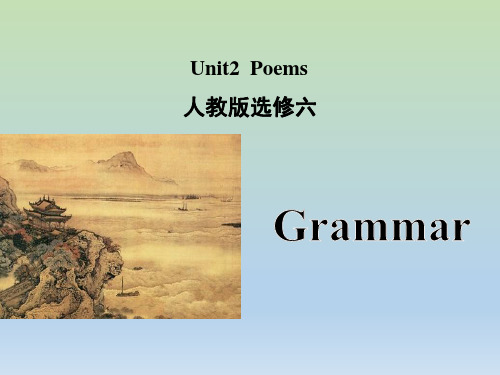
2.用连词or,otherwise,but,however等表示隐含的 条件。 We didn't know his telephone number; otherwise we would have telephoned him. 我们不知道他的电话号码,否则我们就会给他打电话。 She would have come here, but she was too busy with her homework. 她本来早就要到这里来,但是她当时太 忙于做作业了。
Unit2 Poems
人教版选修六
Step1 Warming up 翻译下列句子,体会虚拟语气在句中表达的时间情景。
If it had not been for your suggestions,I would not get such a good job now.
要不是你的建议,我现在就不会得到这么好的一份工作。 If you'd listened to me, you wouldn't be in such trouble now.
事实相反的虚拟语气would be;最后一句话也是与过去事实
相反的虚拟语气,故用wouldn't have died。
答案 D
⑧________for the free tickets,I would not have gone to
the cinema often.
A.If it is not
B.Were it not
【单项填空】
⑥The professor reminded me of what I would ________
have forgotten.
A.therefore
选修6 unit2 语法
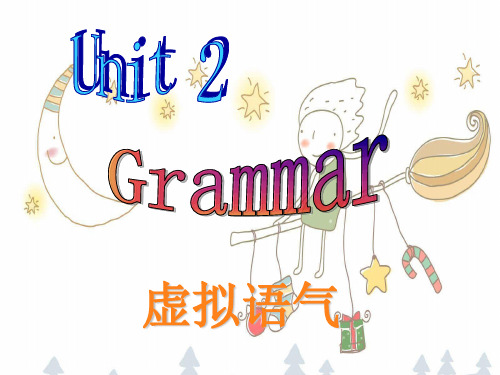
虚拟语气
虚拟语气表示一种不能实现的假设,该语法主要 用于if条件状语从句,也可用于主语从句、 表语 从句、宾语从句等。
通常有三种情况: ①与过去事实相反。
②与现在事实相反。
③与将来事实可能相反。
1. 虚拟语气在if条件状语从句中的用法
条件从句
从句谓语形式 主句谓语形式
与现在事实相
反
动词过去式(或
be _h_e_l_d_o_n_S_a_t_u_r_d_a_y_______.
有人建议,英语晚会周六举行。
8、主语从句It is (high) time that
It is (high) time that 后面的从句谓语动词要用 did/were或用should加动词原形,但should不可省略。
6主语从句It’s necessary/strange/natural/urgent/ important/a pity/no wonder/impossible + that 从句中的动词要 I用t i虚s s拟tr,a即ng(eshthoautl_d_)h_+_e动_(_词s_h_原o_u形_l_d__) _s_a_y_s_o_____.
课堂即时翻译练习
4. 我们建议Tom 去休息一下。 We suggested that Tom have a rest.
5. 他坚决要求我到场。 He insisted that I (should) be present.
课堂即时翻译练习
8. 要是我们的父母能和我们住在一起就好了!
If only our parents could live with us!
It is high time that__________________. 该是我们吃午饭的时候了w。e had our lunch It is time that______________________. 该是他作出决定的时he候m了a。de up his mind
人教高中英语选修六 Unit 2--知识点句型语法
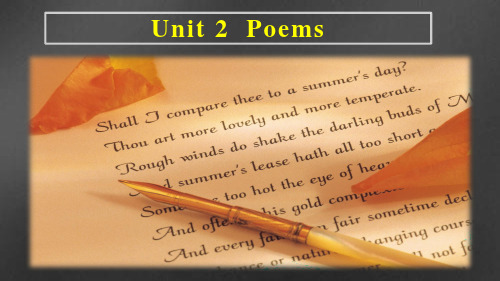
While I admit that there are problems, I don’t agree that they cannot be solved.
我们赞赏你在处理紧急情况时的灵活性。
[教材P10原句] If we hadn’t taken it easy.
如果我们没有太大意 。
take it easy adj. 轻松;放松;不紧张;从容;
= take things easy
take one’s time 不着急 take...seriously 严肃/认真对待... take...for granted 认为…理所应当
[教材P10原句] if we hadn’t run out of energy 如果我们没有精疲力竭
run out of 用完 用尽 用光
主语是人,及物动词短语
run out = give out 用完
(主语是物,不及物,无被动)
use up 用完 (主语是人用主动语
态,主语是物用被动语态)
[教材10原句] Another simple form of poem that students can easily write is the cinquain, a poem made up of five lines..
有这么多不同形式的诗歌可供选择,学生们最终可能会想写自己的诗歌。
eventually adv. 最 后 终 于
finally ultimately lastly in the end at last
[教材P13原句] Match the beginning of each sentence with the appropriate ending. 把每个句子的开头和适当的结尾搭配起来。
人教课标版高中英语选修6 Unit2_单元语法详解
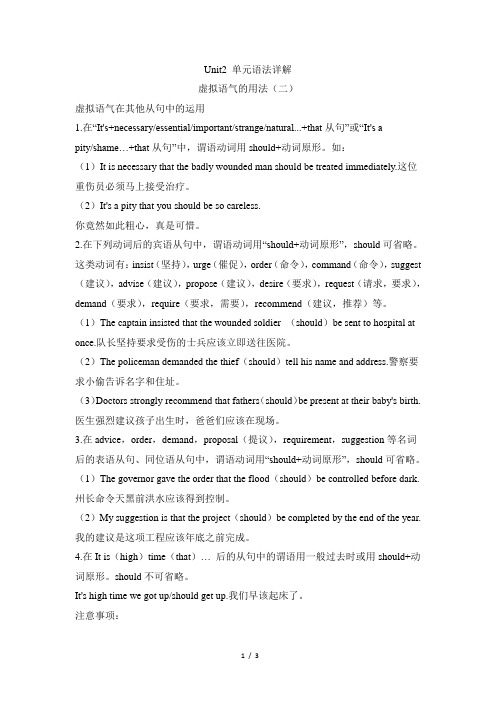
Unit2 单元语法详解虚拟语气的用法(二)虚拟语气在其他从句中的运用1.在“It's+necessary/essential/important/strange/natural...+that从句”或“It's apity/shame…+that从句”中,谓语动词用should+动词原形。
如:(1)It is necessary that the badly wounded man should be treated immediately.这位重伤员必须马上接受治疗。
(2)It's a pity that you should be so careless.你竟然如此粗心,真是可惜。
2.在下列动词后的宾语从句中,谓语动词用“should+动词原形”,should可省略。
这类动词有:insist(坚持),urge(催促),order(命令),command(命令),suggest (建议),advise(建议),propose(建议),desire(要求),request(请求,要求),demand(要求),require(要求,需要),recommend(建议,推荐)等。
(1)The captain insisted that the wounded soldier (should)be sent to hospital at once.队长坚持要求受伤的士兵应该立即送往医院。
(2)The policeman demanded the thief(should)tell his name and address.警察要求小偷告诉名字和住址。
(3)Doctors strongly recommend that fathers(should)be present at their baby's birth.医生强烈建议孩子出生时,爸爸们应该在现场。
3.在advice,order,demand,proposal(提议),requirement,suggestion等名词后的表语从句、同位语从句中,谓语动词用“should+动词原形”,should可省略。
选修六unit2知识点
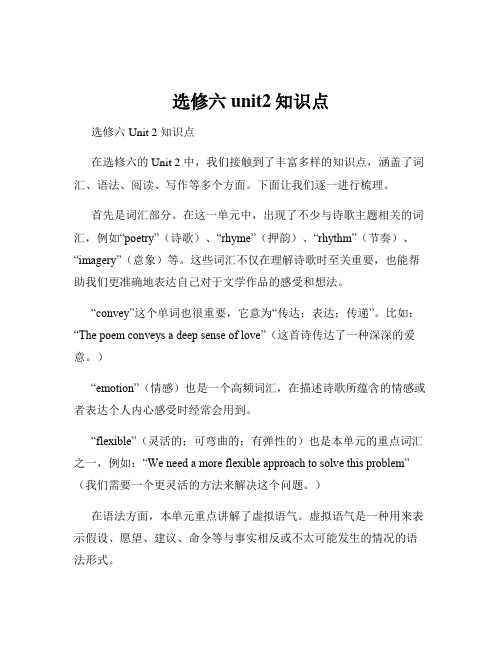
选修六unit2知识点选修六 Unit 2 知识点在选修六的 Unit 2 中,我们接触到了丰富多样的知识点,涵盖了词汇、语法、阅读、写作等多个方面。
下面让我们逐一进行梳理。
首先是词汇部分。
在这一单元中,出现了不少与诗歌主题相关的词汇,例如“poetry”(诗歌)、“rhyme”(押韵)、“rhythm”(节奏)、“imagery”(意象)等。
这些词汇不仅在理解诗歌时至关重要,也能帮助我们更准确地表达自己对于文学作品的感受和想法。
“convey”这个单词也很重要,它意为“传达;表达;传递”。
比如:“The poem conveys a deep sense of love”(这首诗传达了一种深深的爱意。
)“emotion”(情感)也是一个高频词汇,在描述诗歌所蕴含的情感或者表达个人内心感受时经常会用到。
“flexible”(灵活的;可弯曲的;有弹性的)也是本单元的重点词汇之一,例如:“We need a more flexible approach to solve this problem”(我们需要一个更灵活的方法来解决这个问题。
)在语法方面,本单元重点讲解了虚拟语气。
虚拟语气是一种用来表示假设、愿望、建议、命令等与事实相反或不太可能发生的情况的语法形式。
例如,“If I were you, I would take the job”(如果我是你,我会接受这份工作。
)这是与现在事实相反的虚拟语气。
还有“If he had studied harder, he would have passed the exam”(如果他学习更努力,他就会通过考试了。
)这是与过去事实相反的虚拟语气。
在阅读部分,我们通过阅读一些经典的诗歌作品,学习了如何分析诗歌的主题、意象、韵律和节奏等元素。
同时,也培养了我们对于文学作品的鉴赏能力。
在理解诗歌时,要注意捕捉作者通过文字所传达的情感和思想。
比如,有的诗歌可能通过描绘自然景色来抒发对大自然的热爱和敬畏之情;有的可能借助对人物的描写来反映社会现实。
- 1、下载文档前请自行甄别文档内容的完整性,平台不提供额外的编辑、内容补充、找答案等附加服务。
- 2、"仅部分预览"的文档,不可在线预览部分如存在完整性等问题,可反馈申请退款(可完整预览的文档不适用该条件!)。
- 3、如文档侵犯您的权益,请联系客服反馈,我们会尽快为您处理(人工客服工作时间:9:00-18:30)。
2. It is/ was insisted/ ordered/ commanded/ suggested/ proposed/ recommended/ demanded/ requested/ required/ desired/…that… (should) do…
It is required that the papers (should) be handed in before 5:00. 要求5点以前交试卷。
4. It is (high) time that…
should + V原 一般过去式
It is (high) time that we should go to school. = It is (high) time that we went to school. 我们该上学了。
(D) 1. I didn’t see your sister at the meeting. If she ____, she would have met my brother. A. has come B. did come C. came D. had come (D) 2. If we ____ a table earlier, we couldn’t be standing here in a queue. A. have booked B. booked C. book D. had booked
(C) 3. ----Do you think George has passed the driving test? 【2013福建】 ----No. If so, he ______ his car to our college yesterday. A. would drive B. drove C. would have driven D. had driven (C) 4. I should not have laughed if I you were serious. 【2013江苏】 A. thought B. would think C. had thought D. have thought (A) 5. My mom suggests that we eat out for a change this weekend. 【2013陕西】 A. should B. might C. could D. would
三、would 的情况相反 从句用一般过去时 从句用过去完成时(had done) 与过去的情况相反
I would rather you told me the truth. 我宁愿你告诉我事实。 I would rather you had been present. 我宁愿你当时在场。
① Were the weather fine now, we would go for a picnic. 如果今天天气好的话,我们就可以野餐了。 ② Should the weather be fine tomorrow, we would go for a picnic. 如果明天天气真的好的话,我们就可以野餐了。 ③ Had the weather been fine yesterday, we would have gone for a picnic. 如果昨天天气好的话,我们就可以野餐了。
Book 6 Unit2 Poems 语法导学案 虚拟语气(二) 复习
一、虚拟条件句在if条件句中的运用
条件从句的谓语 假设情况 主句的谓语形式 形式 would/could/should/might+ 与现在事实 过去式 V原 相反 ①过去式 would/could/should/might+ 与将来事实 ②should+V原 V原 相反 ③were to do would/could/should/might+ 与过去事实 过去完式(had+ done) have done 相反
四、as if 引导的表语从句
谓语动词用一般过去式, 从句内容与现在事实相反 (be→were) 从句内容与过去事实相反 谓语动词部分为:had done
He looks as if he were a foreigner. 他看上去好像一个外国人。 They talked as if they had been friends for years. 他们就像多年的朋友一样交谈。
③ If the weather had been fine yesterday, we would have gone for a picnic. 如果昨天天气好的话,我们就可以野餐了。
★. 连词if的省略 如果虚拟条件句的谓语部分有were, had和should时, 可省略if, 把were, should和had 放到从句主语前面去, 多 见于书面语。所以以上的句子可改为:
六、在主语、表语、同位语从句中的运用,从句的 谓语用“(should)+ V原”的形式。 1. 以上动词的名词形式:order, command, suggestion, proposal, advice, demand, request, requirement, desire, idea, plan, decision等后面的表语从句或同位语从句中,谓 语的形式为“(should)+ V原”。 My suggestion is that we (should) help him. 我的建议是我们应该去帮助他。
① If the weather were fine now, we would go for a picnic. 如果今天天气好的话,我们就可以野餐了。 ② If the weather should be fine tomorrow, we would go for a picnic. 如果明天天气真的好的话,我们就可以野餐了。
(D) 9. I to my cousin’s birthday party last night, but I was not available【2013安徽】 A. went B. had gone C. would go D. would have gone (A) 10. _____ no modern telecommunications, we would have to wait for weeks to get news from around the world. A. Were there B. Had there been C. If there are D. If there have been.
(D) 17. If you ____the doctors advice, you would have already recovered. A. follow B. followed C. would follow D. had followed (B) 18. If he had not missed the train, he ______by then. A. might get B. might have got C. got D. had got (D) 19. What would you have done last night, if you _____to write your homework. A. hadn’t B. haven’t had C. didn’t have D. hadn’t had (C) 20.______I’d have told you. A. If I would have known it B. If I had have known it C. Had I known it D. should I know it
五、 一坚持(insist); 二命令(order, command); 三建议(suggest, propose, recommend ); 四要求(demand, request, require, desire) 等词后要用 “(should)+ V原”的形式。
I demanded that john (should) go there. 我要求John 立刻到那里。
3. It is / was strange/ natural/ necessary/ important/…that… (should) do… It is necessary that the problem (should) be discussed at once. 立刻讨论这个问题很有必要。
(B) 6. If he had spent more time practicing speaking English before, he able to speak it much better now. 【2013天津】 A. will be B. would be C. has been D. would have been (B) 7. Eye doctors recommend that a child’s first eye exam ______ at the age of six months old. A. was B. be C. were D. is (A) 8. - It rained cats and dogs this morning. I’m glad we took an umbrella. 【2013重庆】 - Yeah, we would have got wet all over if we A. hadn’t B. haven't C. didn't D. don't
(D) 14. Mike can take his car apart and put it back together again. I certainly wish he_____ me how. A. teaches B. will teach C. has taught D. would teach (C) 15. His doctor suggested that he _____ a short trip abroad. A. will take B. would take C. take D. took (B ) 16. I enjoyed the movie very much. I wish I _____ the book from which it was made. A. have read B. had read C. should have read D. are reading
